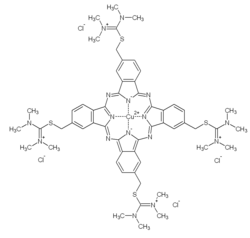Alcian blue stain
 |
|
| Names | |
|---|---|
| Other names
Alcian blue 8GX, Ingrain blue 1, C.I. 74240, "chloromethylated copper phthalocyanine-thiourea reaction products"
|
|
| Identifiers | |
|
3D model (JSmol)
|
|
| ChemSpider | |
| ECHA InfoCard | 100.046.990 |
|
PubChem CID
|
|
|
|
|
|
| Properties | |
| C56H68Cl4CuN16S4 | |
| Molar mass | 1,298.86 g·mol−1 |
|
Except where otherwise noted, data are given for materials in their standard state (at 25 °C [77 °F], 100 kPa).
|
|
|
|
|
| Infobox references | |
Alcian blue or alcian blue (/ˈælʃən/) is any member of a family of polyvalent basic dyes, of which the Alcian blue 8G (also called Ingrain blue 1, and C.I. 74240, formerly called Alcian blue 8GX from the name of a batch of an ICI product) has been historically the most common and the most reliable member. It is used to stain acidic polysaccharides such as glycosaminoglycans in cartilages and other body structures, some types of mucopolysaccharides, sialylated glycocalyx of cells etc. For many of these targets it is one of the most widely used cationic dyes for both light and electron microscopy. Use of alcian blue has historically been a popular staining method in histology especially for light microscopy in paraffin embedded sections and in semithin resin sections. The tissue parts that specifically stain by this dye become blue to bluish-green after staining and are called "Alcianophilic" (akin to "eosinophilic" or "sudanophilic"). Alcian blue staining can be combined with H&E staining, PAS staining and van Gieson staining methods. Alcian blue can be used to quantitate acidic glycans both in microspectrophotometric quantitation in solution or for staining glycoproteins in polyacrylamide gels or on western blots. Biochemists had used it to assay acid polysaccharides in urine since the 1960s for diagnosis of diseases like mucopolysaccharidosis but from 1970's, partly due to lack of availability of Alcian and partly due to length and tediousness of the procedure, alternative methods had to be developed e.g. Dimethyl methylene blue (DMB) method.
...
Wikipedia
